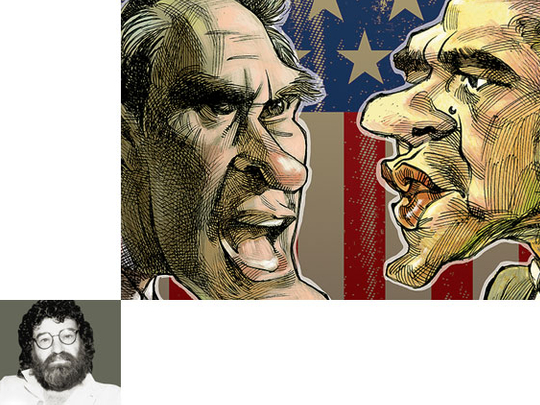
The candidates are on the edge. The audience, 60 million-strong, are enthralled. And the moderator, outwardly calm, is actually nervous. It is, after all, a presidential debate between an incumbent and his challenger for the highest office in the land. And if you’re not nervous moderating the event, you should be Bob Schieffer — a veteran TV personality — who moderated the 2004 debate and recalls that his hands were trembling when he stepped forward to take his hot seat at the moderator’s table. “I never get nervous on TV, I just don’t”, he told the Washington Post earlier this week. “But when you realise that something said on that stage may well determine who wins the presidency, well, it’s different, isn’t it?” Schieffer had no reason to exaggerate the degree of his anxiety at that moment, but he did exaggerate the role that these debates play in determining who becomes the future president of the US. With only four weeks to go until election day on November 6, most voters have essentially made up their minds. Rarely do debates change the course of a presidential race.
Heaven knows, the incumbent and his Republican opponent, Mitt Romney, have spent countless hours with aides cramming for last Wednesday’s 90 minutes of what was dubbed — erroneously, as it turned out — Tension City, at the University of Denver in the battleground state of Colorado, poring over volumes of briefing books and answering questions “as annoying as those asked by White House correspondents”. And there’s Senator John Kerry of Massachusetts, playing Mitt Romney and confronting the president with challenging questions about the economy, health care, taxes, immigration and the rest of it, while the real Romney, disappearing for days from public view, had gone through equally tough cram sessions, including mock debates with Senator Rob Portman playing Barack Obama.
And, oh yes, Romney’s team allegedly also supplied their candidate with a series of so-called zingers that he was expected to memorise and use in rebuttal. A zinger, however, is a last resort, a pithy sound bite, a taunt, if you wish, meant to get one’s opponent off balance. But woe to a presidential candidate whose resort to that tactic appears to the audience as canned or contrived. And Romney, at least on the campaign trail, is more comfortable at gaffes (like his recorded remarks about the 47 per cent or the offer to Texas Governor Rick Perry of a $10,000 [Dh36,780] bet, hardly chump change to a lot of Americans in these difficult economic times) than at bon mots.
So come 9pm and Angles (a popuar joint at Adams Morgan, Washington), patronised predominantly by journalists, writers and news junkies, is now packed with people ready for the smack down.
And the one who got smacked was Obama. The president came across as passive, unsure and hesitant. He would begin a sentence with “well” and “first of all”, a no-no even in a college debating club, and at one time talked about rich folks “making money hand over fist”, hardly presidential idiom. His body language was that of a man who had had a bad day at the office, often refusing to make eye contact with either the moderator or the challenger.
And that night the challenger, who came out swinging from the get-go, truly challenged. He was aggressive, smart, focused and self-confident. It was as if he had had a persona — crisp, capable and persuasive — that he preferred to have kept under wraps during the campaign, only to reveal that night. It was the case of a man who did a good job defending his position and defending it without resort to his well-known, Gee whizz, middle-brow platitudes. Obama, who had not debated anyone in four years, just got lost in the shuffle. The debate, for all it’s worth, was a clear win for Romney, as simple as that.
In an editorial last week, the Washington Post opined: “Both candidates portray this election as a stark choice between radically different governing philosophies and we tend to think that is true. But each has been more eager to scare voters about his opponent’s world view than to explain how his own could cope with 21st century problems”. To everyone’s surprise, Romney did just that last Wednesday night.
Meanwhile, at Angles, the patrons, who stood watching several TV screens (and only the Super Bowl or the World Series would have attracted that many people to a televised event there) were none too pleased. This is Washington and Washingtonians have traditionally voted the Democratic ticket by a margin of 85 per cent. How could Obama’s elan and eloquence have deserted thus?
Half way through the debate, they cringed when Romney dismissively, not to mention disrespectfully, shot back at the president: “I’ve been in business for 25 years, [so] what are you talking about?” and Obama was at a loss for a retort. And at the end of it, no one applauded. Rather, everyone looked down the bridge of his or her nose, stunned, silent and confused.
Oh, well, two more debates left before we go to the polls. And, in the name of mercy, will someone shake Obama out of his zombie state?
Fawaz Turki is a journalist, lecturer and author based in Washington. He is the author of The Disinherited: Journal of a Palestinian Exile.









